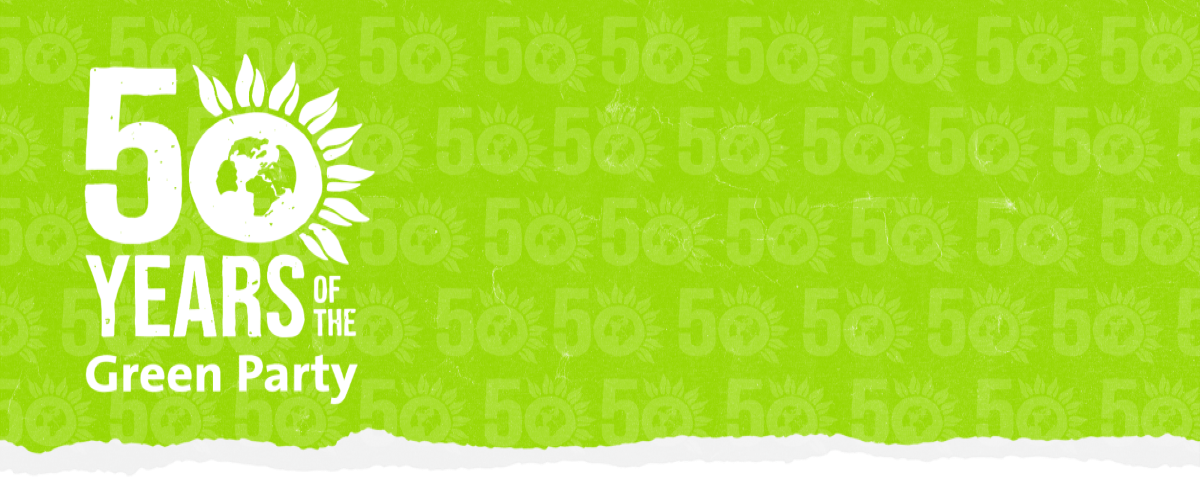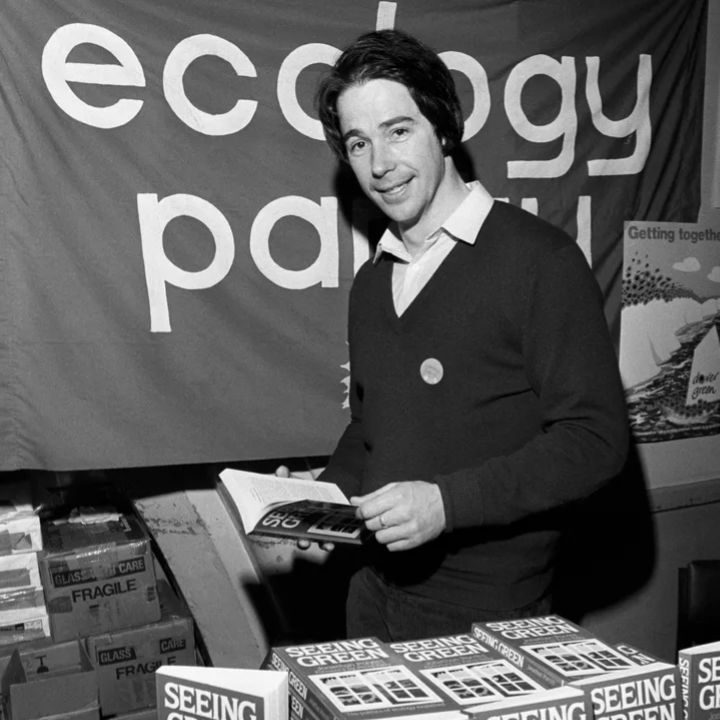|
|
"IN ONE INTERVIEW THE INTERVIEWER STARTED EATING OUR MANIFESTO ON THE GROUNDS I ASSUME IT WAS COMPLETELY RECYCLABLE!" Jonathon Porritt was a leading Green party member in the 1970s and 1980s. Here he recounts events surrounding the 1979 General Election when the party made a breakthrough by qualifying for its first party political broadcast. I joined PEOPLE in 1974, which of course became the Ecology Party in 1975 – and then the Green Party in 1985. There were very few members then and the question was whether we could find a way to break out of obscurity. In those days you needed 50 candidates to qualify for a Party Political Broadcast. So in the run up to the 1979 General Election, we took a punt and said this is the best thing we can do, we will stand 50 candidates. It meant raising far more money than ever before. But the PPB was well received and helped enormously with the coverage we were able to get. Right from the start, the Green Party was unapologetically ideological, and saw itself as “a Party of the left”, though some were persuaded by Die Grunen in Germany to use the slogan “neither right nor left but ahead”. It was a nice slogan, but it never really caught on in the UK. The origins of the party were very much about social justice as well as bio-physical sustainability, and you can see that thread in the Green Party all the way through from that time. I stood in the 1979 General Election. The dominant memory I have is of people being very nice about the Ecology Party. They didn’t see us as a bunch of renegade subversives who threatened the global order - and were correspondingly patronising! Kenneth Baker, who I stood against in Marylebone, couldn’t have been nicer. He was a very smart, urbane, one nation, old world Tory, not like the bunch we have now. He said “it’s wonderful to have another candidate in the constituency”, pretty much patting me on the head! The election campaign itself got a little weird and whacky. In one interview I did, the interviewer, who was notoriously difficult, started eating our manifesto on the grounds, I assume, that it was completely recyclable. I don’t think he understood what recycling was all about! |
|
|
Jonathon Porritt at an event in 1984 to mark the publication of his influential first book Seeing Green. Politics of Ecology Explained. |
|
We thought having stood 50 candidates in 1979, we would be able to build constituency support and make progress in the next election. We put up more than one hundred candidates in1983, but struggled to get traction, to be honest. In 1979 we were new and what we were doing was distinctive. It helps massively having successful local representatives where you are hoping to win, and by 1983 we had a couple of councillors, more by luck than anything else. So the Ecology Party was a hard sell in 1983. I think a lot of people thought we were a flash in the pan. There were also a lot of “environmentally-minded” people at that time who did not see a need for a separate political party. They thought it would be better to support people in other political parties. At the same time, we were endlessly seeing off other initiatives. For instance, the Green Alliance, now a well-known, influential London-based group, which does high level lobbying, were all about trying to prove the Green Party wasn’t really needed at all! The downside too of going from PEOPLE to the Ecology Party to the Green Party was most people did not associate us as having anything to do with economics. So in 1984, before we changed the name to the Green Party, a group of us set up The Other Economic Summit. TOES was a counter movement to the G7 meetings and eventually morphed into the New Economics Foundation, which is a wonderful think tank still there today and still doing brilliant work. At different times over the past 40 years, the Green Party has been accused of talking either too much or too little about the environment and ‘green’ issues! I think the next General Election is going to be an election where these are going to be centre ground for everyone standing, whatever their party. Humankind is in a terrible mess, and the existential threat to the wellbeing of the species is more profound than it has ever been. But it is not just about climate. It is about how we steward the natural earth in a different way. Nationally, rivers have become a huge issue, as has biodiversity, farming and pollution. The Green Party has never had a more propitious backdrop for its campaigning as it will have at the next General Election. |
|
Share your stories of the Green Party over the past 50 years! What events, campaigns, elections or people inspired you to get involved? Go to our Anniversary website to find out more Home - 50 Years of The Green Party. |
|


.png)